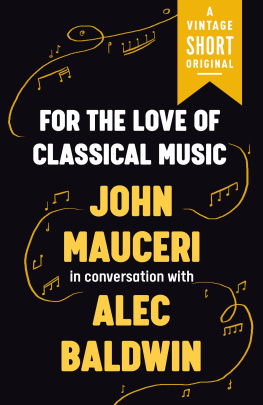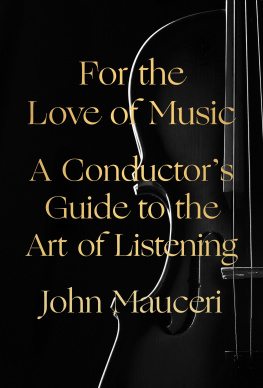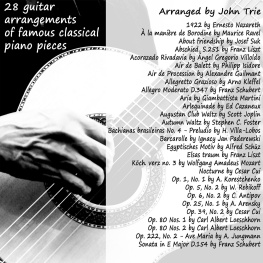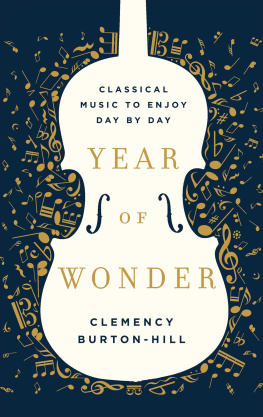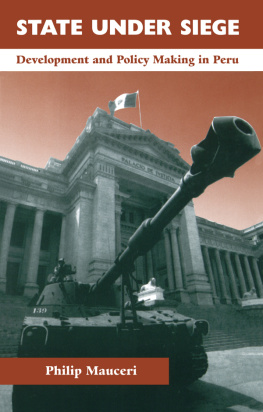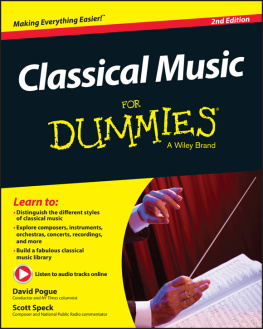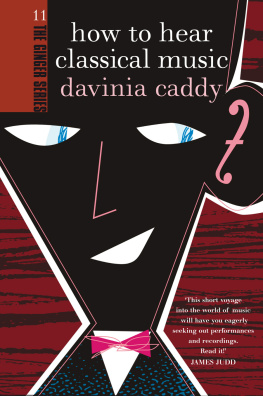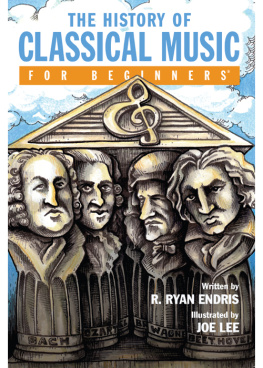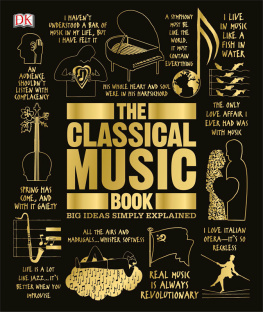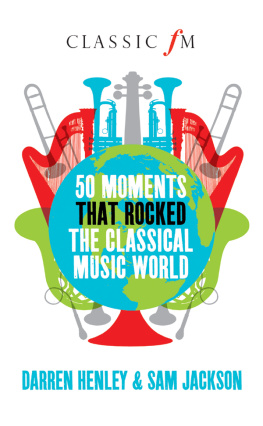John Mauceri - For the Love of Classical Music
Here you can read online John Mauceri - For the Love of Classical Music full text of the book (entire story) in english for free. Download pdf and epub, get meaning, cover and reviews about this ebook. year: 2019, publisher: Knopf Doubleday Publishing Group, genre: Detective and thriller. Description of the work, (preface) as well as reviews are available. Best literature library LitArk.com created for fans of good reading and offers a wide selection of genres:
Romance novel
Science fiction
Adventure
Detective
Science
History
Home and family
Prose
Art
Politics
Computer
Non-fiction
Religion
Business
Children
Humor
Choose a favorite category and find really read worthwhile books. Enjoy immersion in the world of imagination, feel the emotions of the characters or learn something new for yourself, make an fascinating discovery.
- Book:For the Love of Classical Music
- Author:
- Publisher:Knopf Doubleday Publishing Group
- Genre:
- Year:2019
- Rating:4 / 5
- Favourites:Add to favourites
- Your mark:
- 80
- 1
- 2
- 3
- 4
- 5
For the Love of Classical Music: summary, description and annotation
We offer to read an annotation, description, summary or preface (depends on what the author of the book "For the Love of Classical Music" wrote himself). If you haven't found the necessary information about the book — write in the comments, we will try to find it.
For the Love of Classical Music — read online for free the complete book (whole text) full work
Below is the text of the book, divided by pages. System saving the place of the last page read, allows you to conveniently read the book "For the Love of Classical Music" online for free, without having to search again every time where you left off. Put a bookmark, and you can go to the page where you finished reading at any time.
Font size:
Interval:
Bookmark:
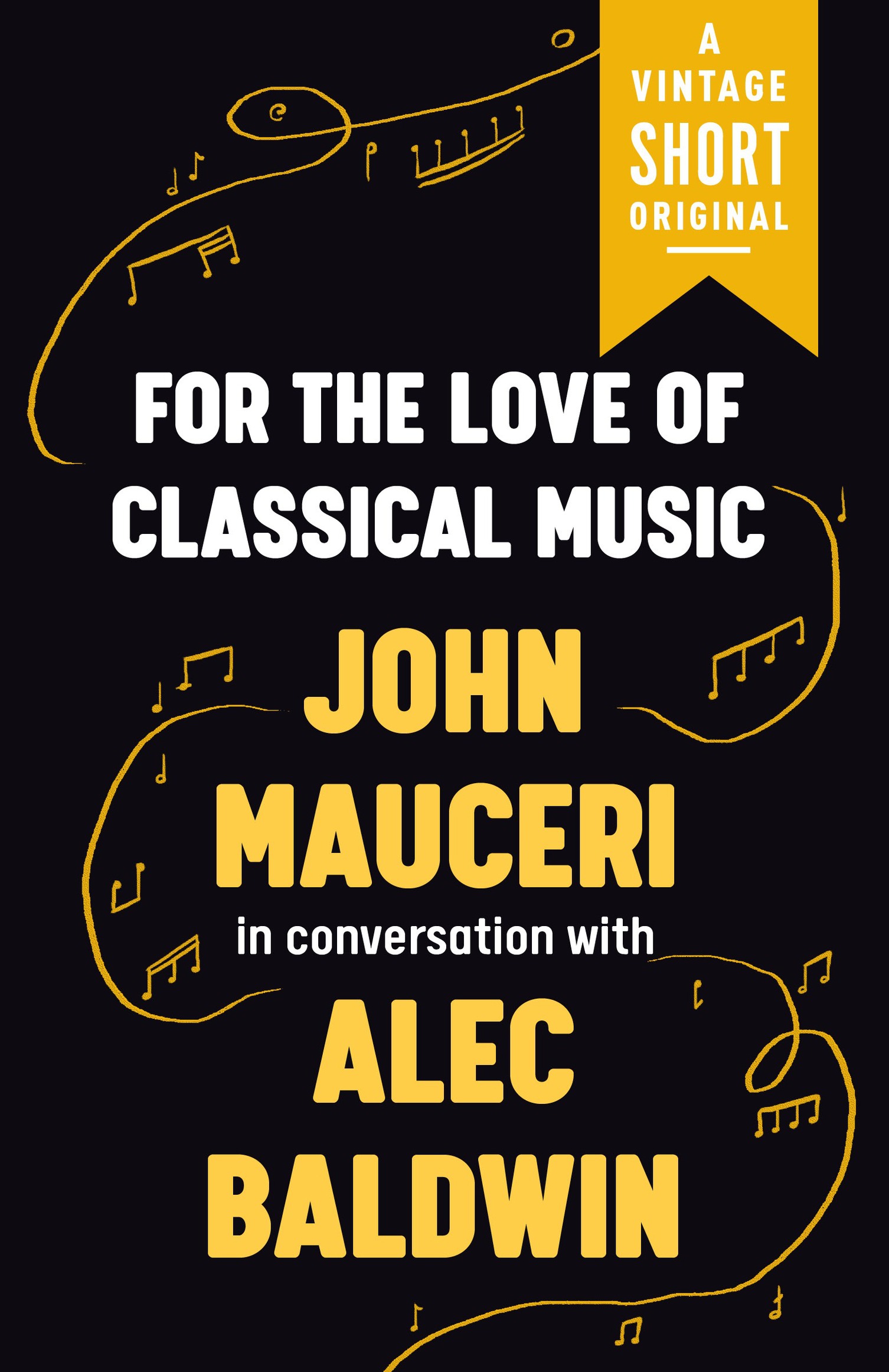
Over the past five decades, John Mauceri has conducted symphonies, operas, ballets, musicals, and film music around the world, and served as music director of four opera companies and three orchestras, as well as hosted television and radio programs. He has more than seventy albums to his name, and is the recipient of a Grammy, a Tony, a Billboard, two Diapasons dor, three Emmys, and four Deutschen Schallplattenkritik awards. He is the author of Maestros and Their Music: The Art and Alchemy of Conducting and For the Love of Music: A Conductors Guide to the Art of Listening has written for The New York Times, TheWall Street Journal, Los Angeles Times, The Times (London), and HuffPost, among other publications. He lives in New York City.
Alec Baldwin is a multiple Emmy, Golden Globe, and Screen Actors Guild Awardwinning actor, producer, comedian, and philanthropist. He has also been nominated for an Oscar and a Tony Award and is the author of The New York Times bestseller A Promise to Ourselves.
For the Love of Music: A Conductors Guide to the Art of Listening
Maestros and Their Music: The Art and Alchemy of Conducting
Leonard Bernstein: A Centenary Celebration (eBook)
A Division of Penguin Random House LLC
New York
Copyright 2019 by John Mauceri
All rights reserved. Published in the United States by Vintage Books, a division of Penguin Random House LLC, New York, and distributed in Canada by Penguin Random House Canada Limited, Toronto, in 2019.
Vintage and colophon are registered trademarks of Penguin Random House LLC.
The Cataloging-in-Publication Data for For the Love of Classical Music is available at the Library of Congress.
Vintage eShort ISBN9781984899590
Cover design and illustration by Madeline Partner
www.vintagebooks.com
v5.4
ep
Alec: Hi, Im Alec Baldwin, and Im here to talk with the one, the only, John Mauceri, about his new book, For the Love of Music. John, I was reading and reading and reading about you. There are many superlatives we can use about your career, artistic and commercial, but four million tickets sold at the Hollywood Bowl when you were conducting the orchestra there with an eighteen-thousand seat venue? Wow. How many years was that?
John: Sixteen.
Alec: Thats a long-running show. You were more successful than Jimmy Fallon. But thats just one component of your career, its so varied. You study at Yale. Then you conduct at Yale and beyond. Youre doing opera. Youre reinvigorating the Broadway catalog. Youve done everything in the world of music. And what I want to know is, whats the thread? Whats the base of that, in your childhood, your familywhere was music born in you?
John: Well, let me start to answer in a roundabout way by saying Im a generalist. I like to explain to people that if youre a specifist, you do one kind of thing. A specifist, for example, in music would be someone whos an expert on [Johann Sebastian] Bach. And a specifist will look at all of Bachs cantatas and tell you about how theyre all a little bit different. A generalist looks at a lot of different things and tells you why theyre the same, and what they have in common. So Im always looking for that line that goes through all kinds of music, that is, the fundamental line of human expression.
For me, music is the most mysterious and powerful art form, because its invisible. That makes it so mysterious, so powerful. It controls behavior. It leads someone to war. It makes people feel peaceful. It makes people feel closer to God.
Gerontologists will tell you that when people are losing their mental faculties, music can draw them back to some central line in their lives. Classical music, which is fundamentally at the center of my wheel, sits there and waits for you to come to it. You can come to it early, as I did. You can come to it late in life. It doesnt judge you. But, once you embrace it, it travels with you the rest of your life.
So in that sense, as a generalist, as someone who has conducted some of the greatest jazz musicians and opera singers, and the great opera companies and Broadway shows, and absolutely straight-ahead pop people, I look for that mysterious thing that threads the music, that takes people to this special place. So that would be a sort of answer to your question. Why did little Johnny do this? Well
Alec: Where did little Johnny grow up?
John: On Long Island. Just like you.
Alec: What town?
John: East Meadow. I was born in Jamaica, Queens, in Mary Immaculate Hospital, where my father was a doctor. And we lived in Laurelton. I went to P.S. 156. I was totally educated through the public school system, until I went to Yale.
Alec: Any siblings?
John: An older brother. And thats a key here. Because Bob, my older brother, loved music also. My paternal grandfather was a musician. He conducted hotel orchestras. He was an immigrant from Sicily. He conducted at the McAlpin Hotel and at the Waldorf Astoria and out at the Steel Pier in Atlantic City. Then my grandma said, Youve got to stay home. So he stayed home, and he taught violin to everybody in Brooklyn. So thats where maybe I get it.
But it was also a relationship with my father. My father was very stern. I believe that explains my approach toward received wisdom, which is always to challenge it. I was always challenging my father who would say, Do this. And Id go, Why?
So although my relationship with my father was not very close, it led me to ask these questions: Why is that considered good, and thats not good? Why is this classical music and this is popular music, and popular music is not as good? So I think Ive always looked at received wisdom and tried to find out what is at the root of it.
Alec: You go to a great school, obviously. Yale. Did you know? I mean, all through your teenage years, did you know that a music career was what was on the horizon for you? Classical music.
John: I can answer it in a kind of a smart-ass way. I was never talented enough to do anything else, so I became a conductor, which, you know, makes people sort of smile. But, in point of fact, I had more performance anxiety playing the piano or singing in public.
Alec: That was your instrumentthe piano?
John: Yes. I started playing the piano when I was four. I would listen to music and then go to our neighbors house. She had a piano. And I would go and figure it out at the keyboard. I didnt learn how to read music until later. Because I would just do what humans have always done for hundreds of thousands of yearsyou learned it, and you repeated it through mimicry, a little bit like how actors work. You do this all the time. You are translating words that are given to you. You become those words. I was doing that very early in life. Thats where it all started. People always said, well, you always wanted to be a conductor. Im not so sure. I think I could have been a lot of things. But heres the thing about being a conductor. You have to have a natural ability to lead. By that I mean when, you say, Lets do this, people say, Okay. Lets do this. Its not about being a martinet or something like that. When I was a kid and Id say, Lets skate today, and everyone would say, Okay, lets skate. Right from the beginning, I was that organizer person. So thats a good thing. Because if you stand in front of an orchestra and you say to the violas, A little less, and we need those notes shorter, they look up at you, and they can do that or not do that. Its not like you have the power to change their lives. I mean, they either do it, or they dont. And they believe that your asking them to do that will make it sound better, will shape it in a certain way. So thats the first thing about conducting which inevitably came.
Font size:
Interval:
Bookmark:
Similar books «For the Love of Classical Music»
Look at similar books to For the Love of Classical Music. We have selected literature similar in name and meaning in the hope of providing readers with more options to find new, interesting, not yet read works.
Discussion, reviews of the book For the Love of Classical Music and just readers' own opinions. Leave your comments, write what you think about the work, its meaning or the main characters. Specify what exactly you liked and what you didn't like, and why you think so.

